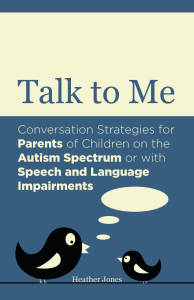 Heather Jones is the author of Talk to Me: Conversation Strategies for Parents of Children on the Autism Spectrum or Speech and Language Impairments – in this new blog she talks about how she was able to talk about a recent health scare with her son Jamie, who has an autism spectrum condition.
Heather Jones is the author of Talk to Me: Conversation Strategies for Parents of Children on the Autism Spectrum or Speech and Language Impairments – in this new blog she talks about how she was able to talk about a recent health scare with her son Jamie, who has an autism spectrum condition.
Recently I had a scare. A big scare.
Cancer.
I’d gone for a barrage of tests (as that’s what doctors do to women of my age) because I had recently returned from living in another country…and the ultrasound on my breast showed a lump. The lump had shady contours, and this led them to recommend a mammogram – immediately. Once I’d had the mammogram, they bundled me off to my GP clutching the X-rays, saying it was an urgent matter and I should see her straight away.
Later that afternoon I was in the doctor’s office, as she explained to me what every word of the radiologist’s reports meant. “They think it’s cancerous,” she said as soon as I walked in. Then she explained what ‘neoplastic lesion’ meant. And she booked me in for a day-long appointment at the local breast clinic.
So there I was – four days before I would have definitive results telling me how far advanced the cancer was, and faced with the decision on who to tell, how and when.
As soon as I walked out of the GP’s office, I knew I had to tell Jamie. My 20-year-old son has Asperger’s (or high-functioning autism) and severe speech and language problems. I’ve been working with him on his communication and conversation for years, and I’d have to tell him first. But how?
I decided the best way was to be as truthful as possible, but not let on too much too soon.
“Jamie.”
“Yes?”
“I went to the doctor’s today.” A pause. “And the doctor felt my breast and found a lump.”
“A lump?”
“Yes, a small round ball of tissue beneath the surface.”
“Oh.”
“They want to look at it more closely and see what it is.”
“Are you sick?”
“No, they have to find out. But they need to know if it’s cancer or not.”
I didn’t want to say the word, but I certainly didn’t want to have conversations around the house or on the phone where Jamie could overhear what was said and be even more worried.
Unfortunately, Jamie had watched a TV series last year where one of the characters developed breast cancer and died. He was immediately anxious. His Facebook comments say it all:
I’m feeling sad right, my mum………… my…… mum….. (crying) oh…… she’s got…….. (sniffs) she’s got a lump in one of her breasts…….. (crying), ………. I don’t know if she’ll be alright or not, breast cancer is not alright, and if I’m the only son left in the house does that mean, I’ll have to do everything that all grown ups do, I’m suffering because it’s happening, I never even know that this would happened, I thought I would stay with her and not think that breast cancer would happen,…. man that’s so wrong, so wrong.
— feeling sad.
I was so choked up when I read that, but at least it gave me an insight into what his real fears were – being a grown-up without me to care for him. As soon as I read his post, I sought him out and talked him through it, explaining how there was so much they can do now to help it, how it’s been caught early, and so on. I reassured him that he would have family to help him. I would never leave him on his own.
After the tests at the breast clinic, the specialist rang me at home and said that the lumps were benign. I was absolutely thrilled and went straight to tell Jamie.
“Hell, yeah!” he shouted, punching the air. “Hell yeah!”
He wrote on Facebook that night:
My mum lives, no breast cancer, no losing someone who’s been doing everything for me from time to time, and no suffering.
It was a glorious day – but I don’t regret telling him and being clear from the start that it might be a dangerous situation. I want him to know I will always tell him the truth and not keep bad news from him. Our love for each other is powerful, and can only be strengthened when honesty is expected and returned.
Heather Jones is the author of Talk to Me: Conversation Strategies for Parents of Children on the Autism Spectrum or Speech and Language Impairments which is available in paperback or e-Book from Jessica Kingsley Publishers
For more information about Heather, her book and the work that she does please visit http://www.heatherjonesauthor.com/